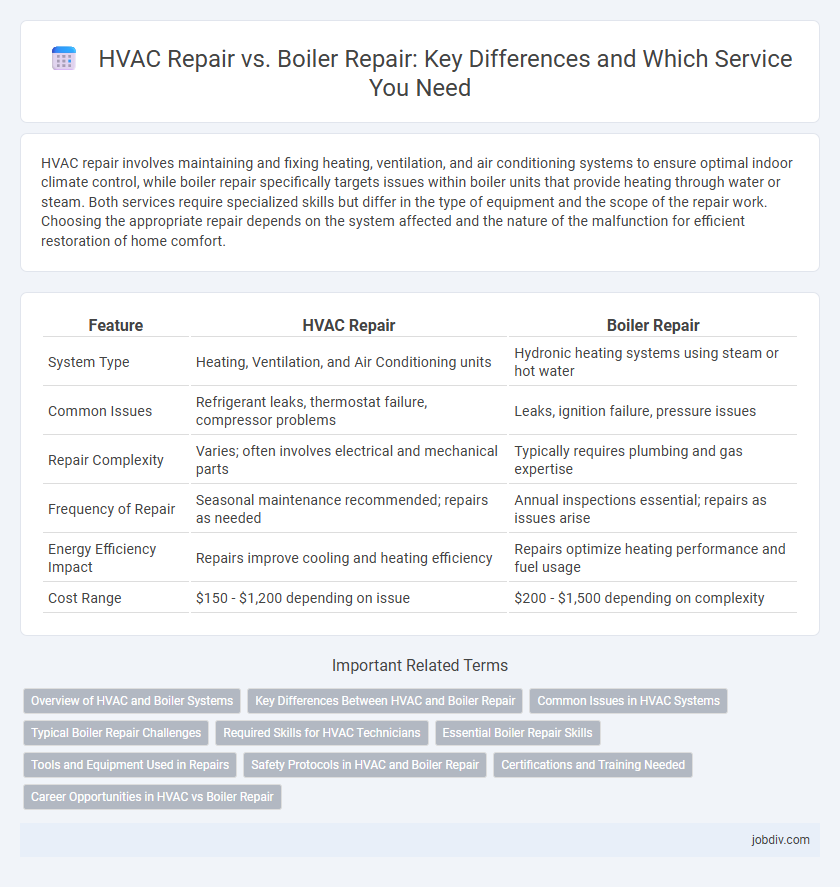HVAC repair involves maintaining and fixing heating, ventilation, and air conditioning systems to ensure optimal indoor climate control, while boiler repair specifically targets issues within boiler units that provide heating through water or steam. Both services require specialized skills but differ in the type of equipment and the scope of the repair work. Choosing the appropriate repair depends on the system affected and the nature of the malfunction for efficient restoration of home comfort.
Table of Comparison
| Feature | HVAC Repair | Boiler Repair |
|---|---|---|
| System Type | Heating, Ventilation, and Air Conditioning units | Hydronic heating systems using steam or hot water |
| Common Issues | Refrigerant leaks, thermostat failure, compressor problems | Leaks, ignition failure, pressure issues |
| Repair Complexity | Varies; often involves electrical and mechanical parts | Typically requires plumbing and gas expertise |
| Frequency of Repair | Seasonal maintenance recommended; repairs as needed | Annual inspections essential; repairs as issues arise |
| Energy Efficiency Impact | Repairs improve cooling and heating efficiency | Repairs optimize heating performance and fuel usage |
| Cost Range | $150 - $1,200 depending on issue | $200 - $1,500 depending on complexity |
Overview of HVAC and Boiler Systems
HVAC systems regulate indoor climate by combining heating, ventilation, and air conditioning components to control temperature and air quality. Boiler systems specifically focus on heating by circulating hot water or steam through radiators or underfloor pipes. Understanding the operational differences helps determine appropriate repair techniques and maintenance schedules.
Key Differences Between HVAC and Boiler Repair
HVAC repair involves servicing heating, ventilation, and air conditioning systems to maintain indoor air quality and comfort, while boiler repair focuses specifically on fixing boilers that provide heat through water or steam. HVAC repairs often address a wider range of components such as ductwork, thermostats, and refrigerants, whereas boiler repairs concentrate on elements like burners, heat exchangers, and pressure valves. Understanding these key differences helps ensure targeted maintenance that enhances system efficiency and prolongs equipment lifespan.
Common Issues in HVAC Systems
Common HVAC system issues include refrigerant leaks, sensor malfunctions, clogged filters, and electrical problems, which can reduce efficiency and indoor air quality. Unlike boilers that primarily face problems like pressure loss, pilot failure, and sediment buildup, HVAC repairs often address airflow inconsistencies and thermostat failures. Regular maintenance improves HVAC performance by preventing compressor failures and ensuring optimal heat exchange.
Typical Boiler Repair Challenges
Typical boiler repair challenges include addressing issues such as pressure problems, faulty thermostats, and leaking pipes, which often require specialized knowledge of boiler systems and components. Unlike HVAC repair, which covers a broader range of heating, ventilation, and air conditioning units, boiler repair demands expertise in managing combustion processes and maintaining water circulation. Proper diagnosis and timely maintenance are critical to prevent costly breakdowns and ensure energy-efficient boiler operation.
Required Skills for HVAC Technicians
HVAC repair requires technicians to possess expertise in diagnosing and maintaining complex heating, ventilation, and air conditioning systems, including refrigeration cycles and electrical components. Boiler repair demands specialized knowledge of high-pressure steam and hot water systems, combustion processes, and safety protocols related to gas and oil-fired boilers. Proficiency in system diagnostics, mechanical aptitude, and adherence to safety standards are essential for both HVAC and boiler repair technicians to ensure efficient and reliable operation.
Essential Boiler Repair Skills
Essential boiler repair skills include diagnosing combustion issues, repairing or replacing faulty heat exchangers, and maintaining efficient gas valve operations. Technicians must be proficient in interpreting pressure and temperature readings to ensure safe and reliable boiler performance. Expertise in handling electrical components and ensuring proper ventilation is critical for preventing hazardous conditions during boiler repair.
Tools and Equipment Used in Repairs
HVAC repair involves tools like refrigerant gauges, vacuum pumps, and multimeters to diagnose and service air conditioning and ventilation systems, while boiler repair primarily requires pipe wrenches, pressure gauges, and combustion analyzers for heating system maintenance. Specialized equipment such as leak detectors is essential for both, but boiler repair often demands more heavy-duty tools for handling high-temperature and high-pressure components. Technicians use these tools according to the system type to ensure efficient, safe, and accurate repairs.
Safety Protocols in HVAC and Boiler Repair
Safety protocols in HVAC repair emphasize proper handling of refrigerants, ensuring electrical components are disconnected, and verifying ventilation to prevent exposure to harmful gases. Boiler repair safety focuses on inspecting pressure relief valves, monitoring gas connections for leaks, and conducting thorough checks of combustion chambers to avoid explosion risks. Both HVAC and boiler technicians must adhere to strict industry standards and wear protective gear to maintain a safe working environment.
Certifications and Training Needed
HVAC repair technicians typically require EPA certification and industry-specific training covering refrigeration, electrical systems, and airflow diagnostics, while boiler repair specialists must hold certifications such as the National Board Certified Boiler Operator license or a state-specific boiler operator certificate. Both fields demand rigorous knowledge of safety protocols, but boiler repair often involves more intensive boiler-specific training due to the complexity and pressure vessel regulations. Proper certification ensures compliance with local codes and guarantees the technician's proficiency in handling specialized equipment safely and efficiently.
Career Opportunities in HVAC vs Boiler Repair
Career opportunities in HVAC repair encompass a broad range of skills including air conditioning, ventilation, and refrigeration systems, offering diverse job prospects in residential, commercial, and industrial sectors. Boiler repair specialists focus on maintaining and fixing boilers and heating systems, often requiring specialized knowledge in steam generation and pressure management, with job availability concentrated in industrial plants, large buildings, and mechanical facilities. The HVAC field generally presents more varied growth potential and higher employment rates due to its comprehensive scope and increasing demand for energy-efficient climate control technologies.
HVAC Repair vs Boiler Repair Infographic

 jobdiv.com
jobdiv.com